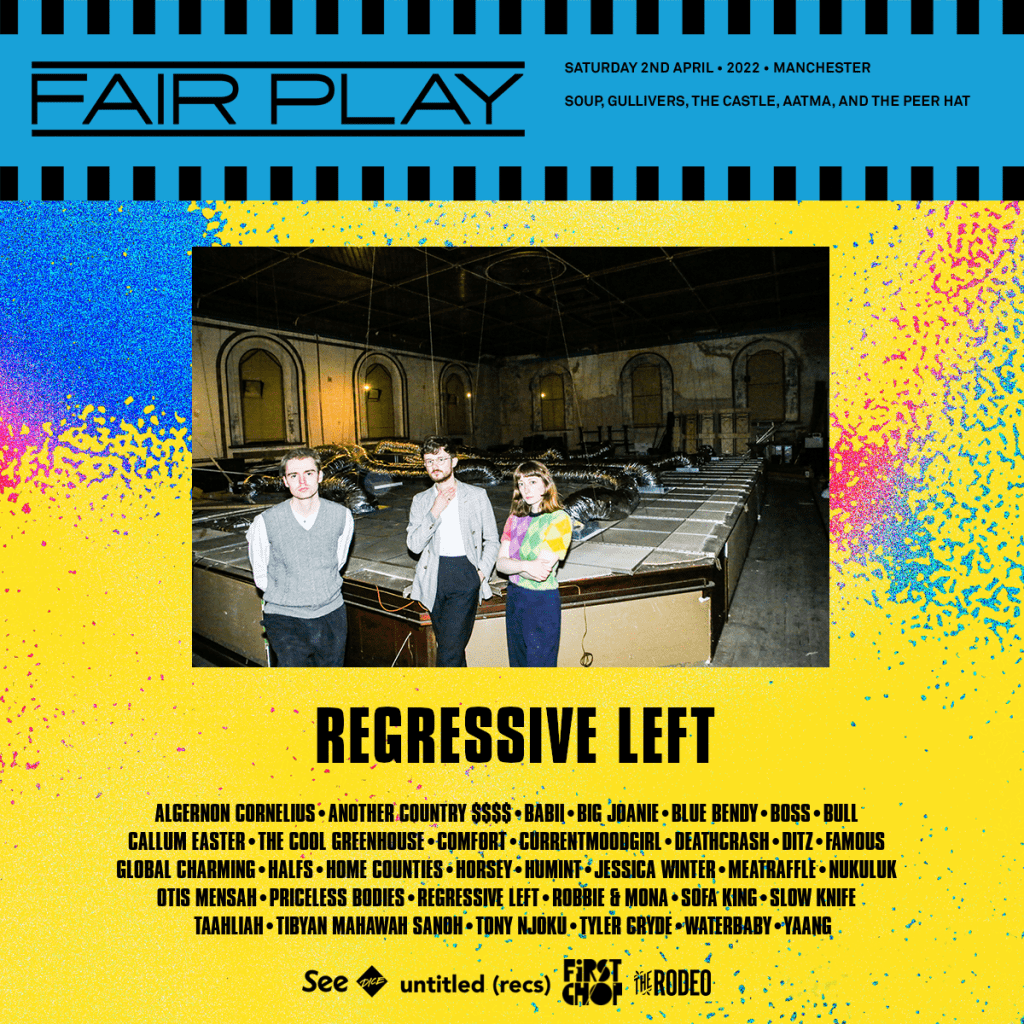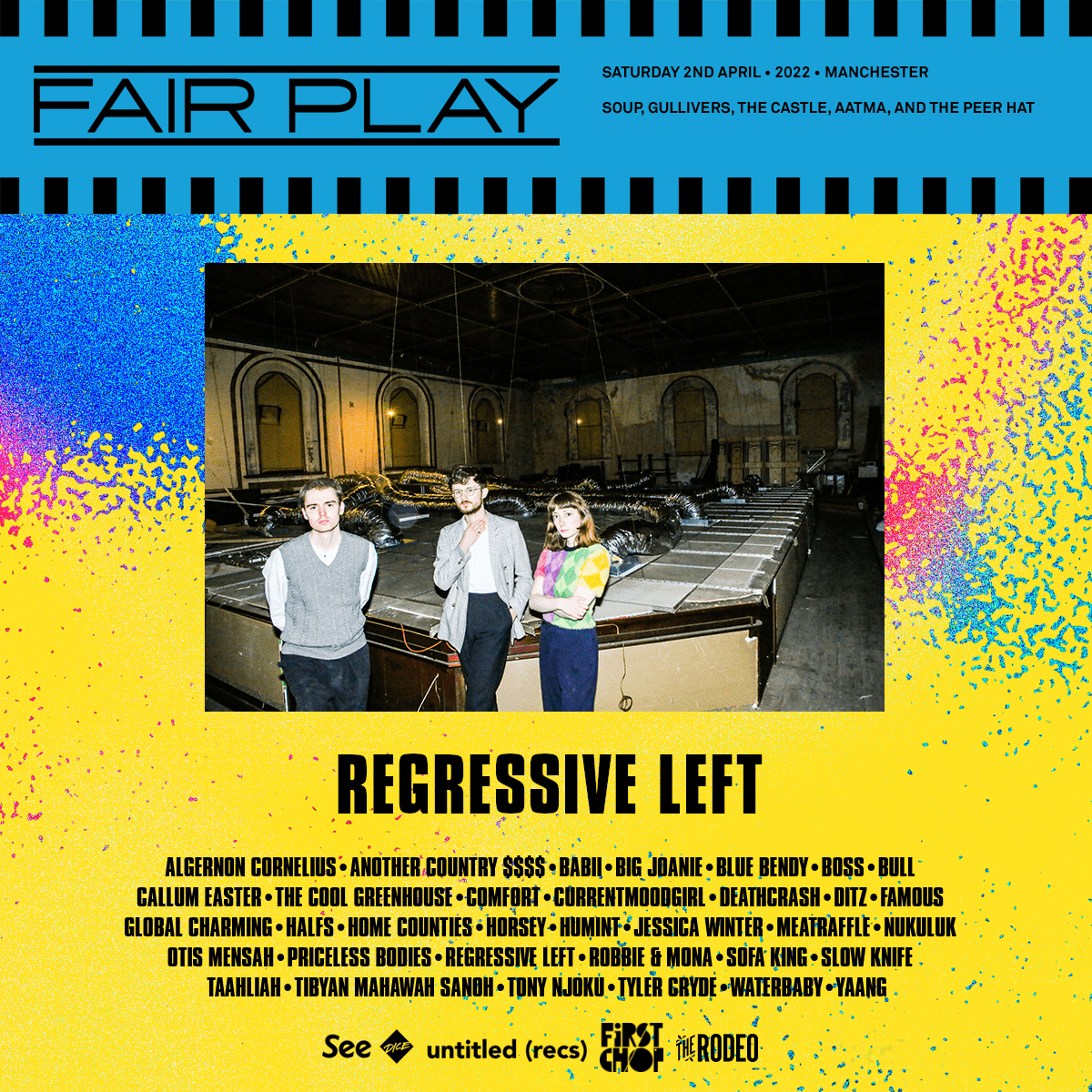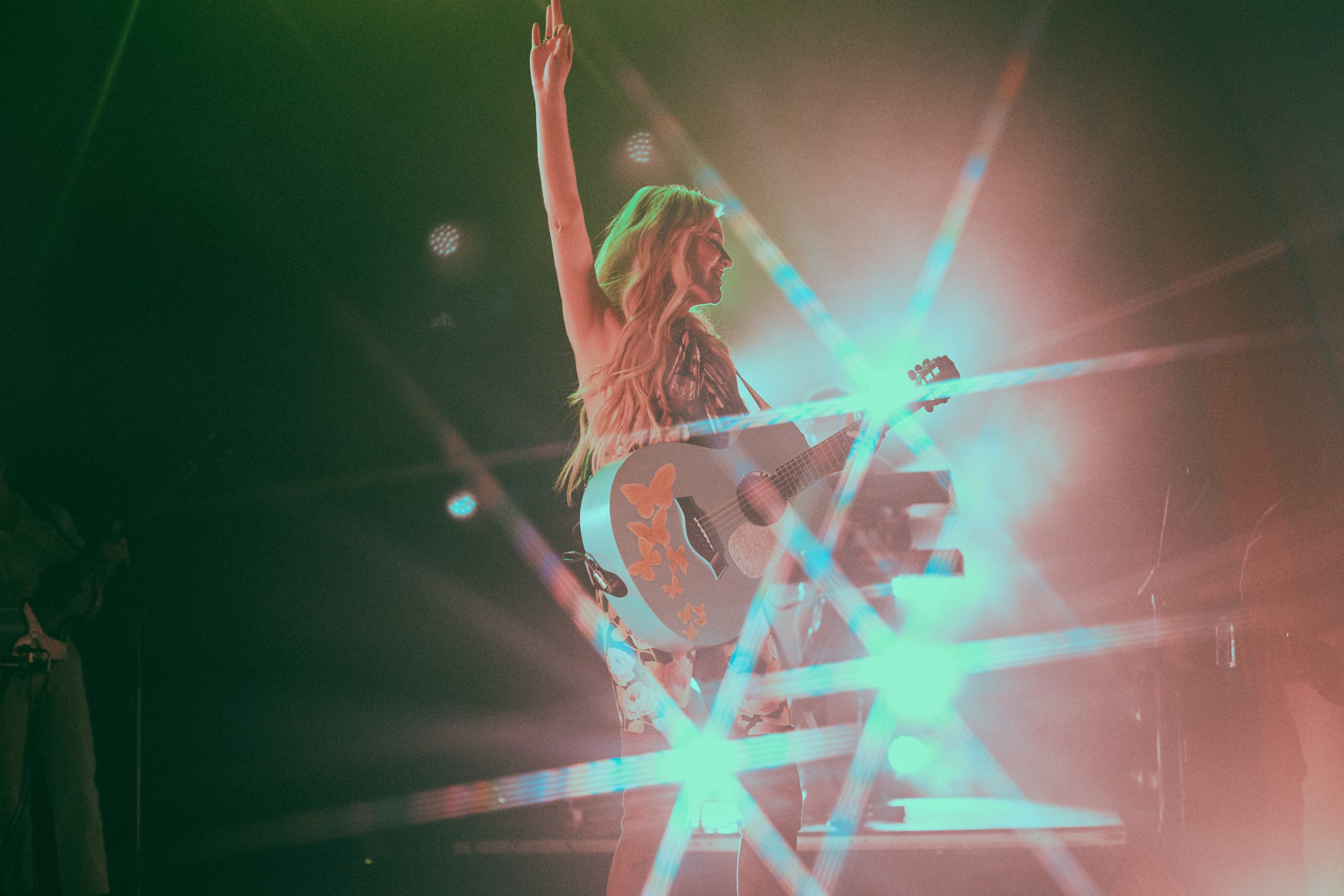Google ‘regressive left’ and you’ll find that, amongst the Wiki definitions and political think-pieces, an increasing number of search results are articles in praise of the socially conscious yet danceable music from a band of the same name. Consider this interview firmly in the latter camp.
Simon Tyrie (vocals & electronics), Georgia Hardy (drums) and Will Crosby (guitar) – under the moniker Regressive Left – have been making waves in industry circles since the release of their debut single, ‘Eternal Returns’, at the end of 2020. Opening with the line, ‘Nobody carries around change anymore / They wait for it to come’, the track immediately and assuredly staked the band’s claim in the sphere of political post-punk. And yet to describe it as such doesn’t do justice to how undeniably fun their music is too; with percussive hints of Tom Tom Club, The Orielles and some gloriously distorted guitars, Regressive Left craft non-prescriptive, modern new-wave that’s delivered with a healthy dose of acerbic wit.
Having played their first live shows only last year, the trio have since notched up performances at tastemaking festivals such as Dot to Dot, Wide Awake and End of the Road, as well as a headline slot at Brixton’s iconic Windmill. The Rodeo caught up with all three members on a sunny Saturday afternoon to talk about the story so far.
Once gigs finally got going again after COVID, things seemed to accelerate pretty quickly for you – am I right in saying that one of your first proper live shows was Latitude last year?
Will Crosby: That was our first! It wasn’t meant to be – we had other ones scheduled and they got cancelled. So yeah, rocking up to Latitude was the first time we’d played any of these songs live or even been on the stage together.
So how did you find the process of recording your initial material without live shows and that feedback from audiences?
Georgia Hardy: Because we’ve been making music together for a long time anyway, we already kind of knew what we wanted to do with this project, so it felt quite fully formed.
Simon Tyrie: If anything, it was a bit of a relief to not have had to play gigs since we started. I would say it’s only now – after doing these gigs for nearly a year – that I’m starting to have another look at how we perform as a live act. Latitude was a bit of a sudden learning curve in that regard – all of the festivals were, and obviously you get used to playing festival crowds, which is very different to then coming back and playing a venue.
Yeah, I saw you play Wide Awake last September, and I think your slot was one of the first in the day – that must be quite a different atmosphere to work with compared to, say, playing a local venue at 10pm.
GH: People at festivals are always there to have a good time, so they’re quite easy to win over.
ST: Yeah, the first time we played London was for So Young. And the crowd was still good, but obviously it’s a London crowd – they’re there to analyse the music, as opposed to just being pissed at a festival. So yeah, I think we actually had quite an easy sort of start; even though we were starting on these big stages, the crowd was so positive and easy to engage.
You grew up in Luton and Bedford – have you found there’s a big difference between your hometowns and London?
GH: Yeah, we wanted to make sure we said that we were from Luton and Bedfordshire because we wanted younger bands that were starting out in those places to feel like you can come from a working class town and still do well – you don’t have to be in London to make good music.
WC: We got a lot of support early on from BBC Three Counties. Obviously, the BBC Introducing does play a bit of a role in [exposure] and actually, if every band says they’re from London, you start to get this oversaturated area. So it’s probably better for a lot of bands, in some ways, to say that they’re from a specific area. I think when we were living in London, it started to feel like the music scene was getting really London-heavy.
GH: And obviously, it’s really expensive to live in London. The majority of the people that are in bands are from well-off backgrounds; they’re only able to make music in London because their parents are helping them. Whereas in Luton and Bedford, everyone’s on a lot more of an even keel. You don’t really have that kind of disparity between the rich kids that can spend all day making music and the ones who can’t.
You all have a background in music beyond just being in a band – Georgia, I know that you work with [industry diversification platform] Route and [events promotion company] Spilt Milk. Was the need for this sort of democratisation of the industry especially evident in London?
GH: Yeah, it is – it’s really hard to get a foot in the door unless you know someone. And the work is often badly paid and precarious, so it’s kind of hard to even do that [work in the music industry] unless you can financially support yourself. I started Route with my friend Jamal – it was just a way for us to make it easier for normal people to get in the industry and learn more about it, because it’s so gate-kept. We just wanted to pass the knowledge that we’ve got down, to make it a bit easier for the next generation.
And you’ve all got backgrounds in DJ-ing as well?
WC: I met Simon and Georgia at a music venue, but the first time we properly interacted was when they asked me to come and DJ one of their nights. Which is basically just me playing my favourite records to three people on the dance floor… and then by the end of it, two people on the dance floor.
GH: There was a period where we would DJ more than we were making music, and we had loads of fun doing that. We wanted to bring some of the energy of DJing into the music that we make.
ST: It was almost more fun than playing music as a band, because everyone’s always having a good time. When you’re playing as a band, everyone’s watching you and analysing your performance. We played Southsea the other day and there were all these men sort of like, stroking their beards.
All the 6 Music dads?
ST: Yeah, exactly. Whereas when you’re DJing, it’s just people having a really good time – they’re just dancing. We wanted to bring some of that party-ish atmosphere [to the band], which is why the festivals were a great way to start, because it’s a similar feel.
What you’ve released so far does have that new-wave groove to it and doesn’t seem to take itself too seriously. How did you find it combining your different musical backgrounds into one sound?
GH: We’re all into different music, but we all really like dance music, of all genres – just any music that you can dance to. So yeah, that kind of New Wave, New York, punk sound was a good crossover. One of our favourite bands is the B52s; obviously, they’re such a fun band and they don’t take themselves seriously. And a lot of Simon’s lyrics are quite tongue-in-cheek… the music is probably serious, but it’s also fun.
WC: Well, I mean, even when the music is serious, we’ve got some songs that compositionally are just ridiculous. It is a serious project, but between some of the tongue-in-cheek lyrics and some of the musical decisions, it ends up being something that doesn’t take itself too seriously.
ST: Before this project started, we were all going out to see lots of new London jazz stuff. And jazz has a reputation as being very serious, but all these new jazz acts were just having a very good time, and they didn’t care that they were merging all these different things together. Like Kamaal Williams and Yussef Dayes, their project together was dance music, but it was jazz. And we wanted to sort of take a leaf out of their book. I don’t know if it necessarily sounds like that, but in terms of bringing our different influences together, we were just quite happy to be completely free about it.
And speaking more lyrically, or topically, I suppose – had you set out to be a deliberately political band, or was that something that just emerged as you observed what was happening around us?
ST: A bit of both – I think I was struggling to write about anything else. So it wasn’t like I wanted to write just about politics necessarily. But equally, obviously, arriving at the name Regressive Left, I knew that I wanted almost a… vessel for the ranting, the dialogue and the discourse.
GH: I think going back to what you said earlier about doing stuff like Route – we’re all politically active people just in our normal lives, and that’s the kind of stuff we talk about as friends. We were never really going to make music that was anything other than political.
ST: And I feel quite sad for younger generations, because when we were like, 15-16, politics wasn’t quite as horrible. You know, things were bad. But it wasn’t this constant, doom-scrolling drip feed of ‘everything is terrible’. I think we were quite lucky in that we had a couple of years when we were teenagers where we could just listen to bands like Tame Impala. It seems almost a bit hard to imagine that now – singing songs that are quite… whimsical.
GH: It would feel a bit out of touch with the time to be writing just like, happy go lucky songs.
You mentioned the idea of doom scrolling. It seems that in the past few years, social media has become a massive part to play in people’s political awareness. What do you make of the trend for Instagram activism or infographic sharing, and how do you exist as a political band on social media?
GH: We don’t post about political things – even as people individually, we don’t really do that. And there is a sense of ‘if you’re not posting about politics, are you being politically active and opposing things?’. But then actually, you know, what you do in real life – stuff like Route – is way more important than sharing a post that says, ‘fuck the Tories’ or whatever. It’s also really important to not get worn out. We were talking about this exact thing the other day – sometimes, it gets to the point where I see so much on social media that it makes me kind of despondent to it or fatigued by it. You can’t physically feel passionate and angry 100% of the time, you know?
ST: Some people can…
GH: Yeah, but it’s not healthy. On social media, it’s so easy to be like that. But that doesn’t actually get you any closer to changing things.
ST: Yeah, it’s a really difficult one with Instagram activism and the like; I think, on one hand, it’s always a good thing for there to be more information out there and for people to be more tuned in, more aware – that’s the freedom that the internet can provide. But there is a real danger in trying to distil quite complex things into however many characters that you can tweet, or a sort of snazzy Instagram story. And it’s the same thing with music – you can’t really put quite a complex argument into a pop song very easily. With social media, it just encourages being contrarian for no real reason; everybody needs to have a take. And sometimes there isn’t really the right take. Imagine if every book on politics was just a tweet. You can’t do it – [social media] doesn’t encode that level of introspection, and comprehension.
With the band name being Regressive Left, have you found that that’s geared any attention from the right wing towards you?
WC: Yeah, the right don’t seem to get irony, which is why I feel bad for them. But yeah, we’ve definitely had a few nutters throw their opinions our way. But regardless of your band name or anything like that, once you make something and put it out there, you have no control over who comes upon it and who responds to it. Clearly, there are definite communities who we don’t aspire to be enamoured with us. I always take it as a compliment though. If [right wing people] like our music so much that they’re willing to get through all of their disagreements with us then, you know, these tracks must be more catchy than we think.
I suppose people like that aren’t necessarily going to listen to a shouty left-wing band screaming at them, but if they’re having a bit of a groove…
WC: I would say that’s a bit of a gap that I like to think we fill, or attempt to fill. A left-wing political band that isn’t didactic or telling off its audience.
ST: Talking to people who are right-wing, you’ll normally identify the same problems in society and just come to completely different conclusions on how to sort them out. And so we’re not necessarily saying ‘you must do this’, but we are talking about the problems and gently nudging people towards the solution.
WC: And I feel like doing a slightly tongue-in-cheek critique is a way of holding up a mirror and getting someone to re-evaluate something, just as much as a manifesto style song would do that job. There’s very different ways of going about it and you get different reactions from perhaps the same people.
Your Instagram bio is ‘seize the means of music production’. Obviously that’s a bit tongue-in-cheek, as you were saying, but your first singles were really quite DIY. Is that something that’s quite important to your identity as a band?
GH: The first two tracks we put out were completely self-recorded and self-produced. The third we had someone co-produce. To be honest, in the beginning it was purely – well, 90% – a financial decision. We didn’t have the money to get someone else to produce it, and then over time we’ve got better at producing the music ourselves. I think we’ve all got quite a strong idea of what we want the songs to sound like, so it was just easier to do it ourselves. But we’ve actually just started working with a producer, and we’re really excited about how those songs are shaping up.
ST: ‘Seize the means of music production’ was actually the name of a really early demo when Regressive Left first started. But yeah, it’s a good thing to be DIY, to try and control as much as you can and not rely on the industry, who often doesn’t have your best interests at heart. There are these types of people that are like estate agents who pull all the strings but don’t really care about music, and it can be quite frustrating.
So, tour plans – you’ve just come back from dates with BODEGA and you’re going off with Folly Group again soon, as well as playing Manchester’s Fair Play Fest on 2nd April.
ST: Yeah, I love Manchester – I’ve got family up there.
GH: We played Manchester Psych Fest last year, but we were on at like 3am so it was a bit of a mental one.
ST: The only people left were like… who you’d think would be still standing at 3am. It was busy, but I’m not sure if they’ll remember the night.
WC: Thankfully they seemed at a similar stage of psychosis as us 3 did on stage.
And with these upcoming shows are you going to be showcasing a bit of new material?
ST: We’ve got loads of songs, but we’ve just been hammering the same set every night to get that really nailed. On tour with BODEGA though, they changed their set every night and it was actually really fun. So this is a discussion we need to have internally….
Manchester, watch this space.

Find out more about Route here.


